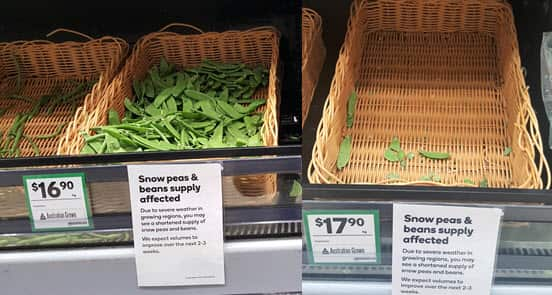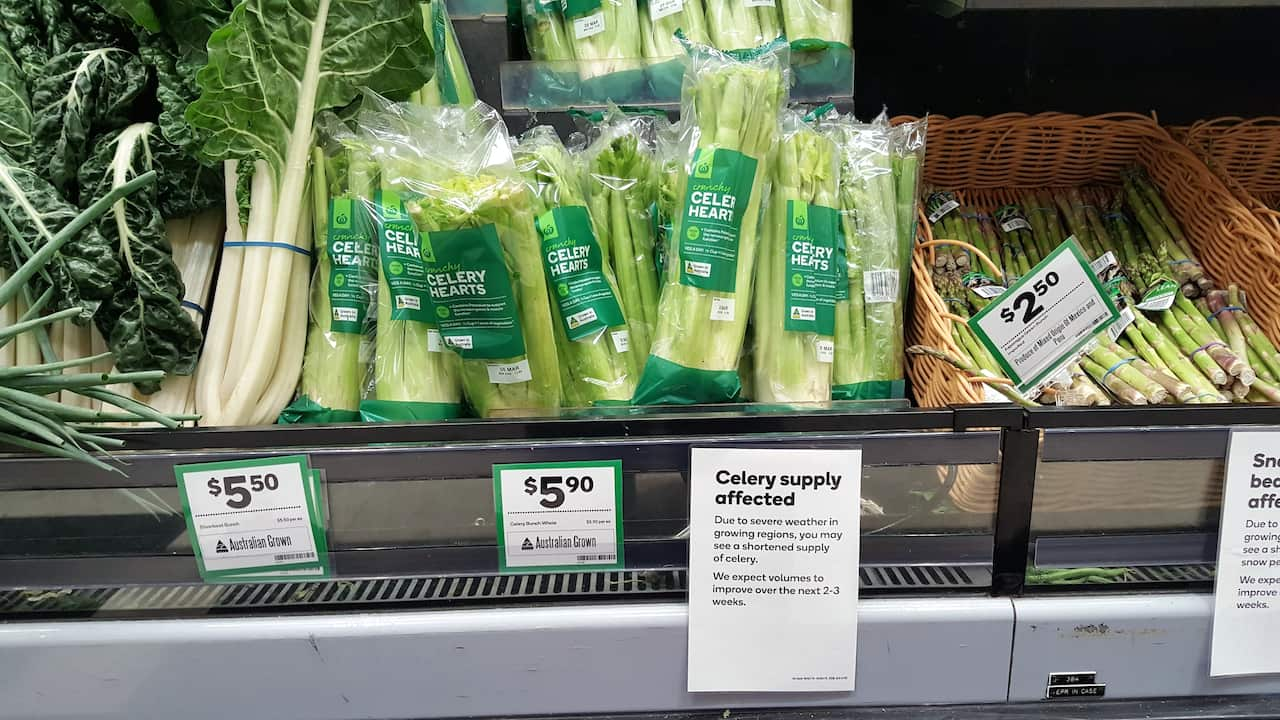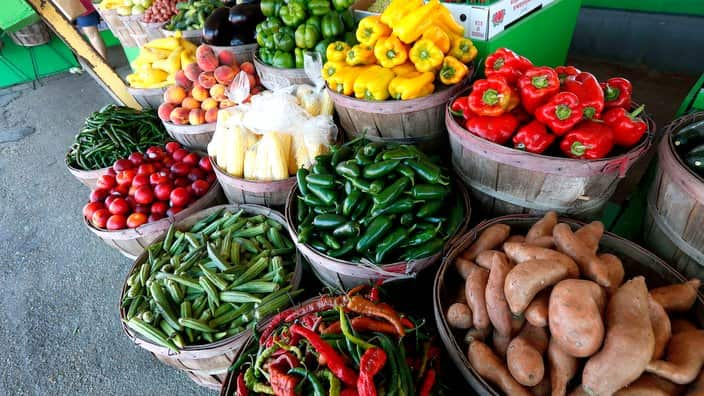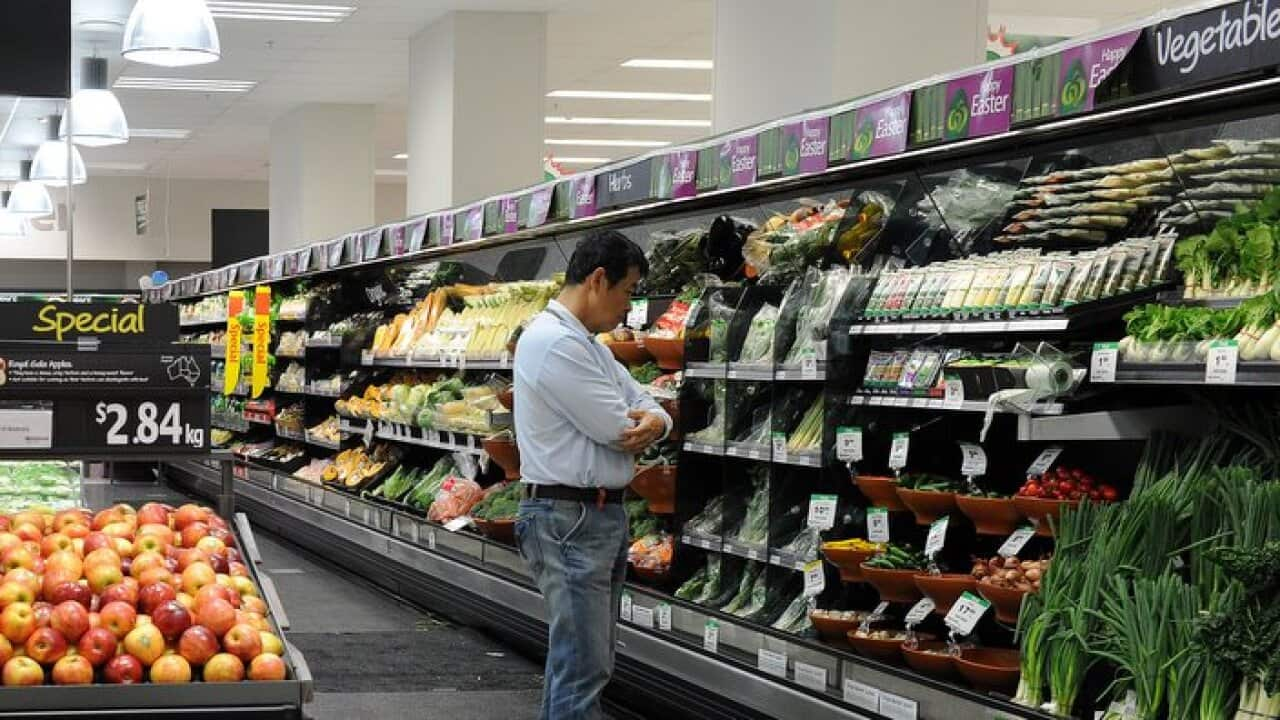In some Brisbane suburbs, it started with coriander a couple of weeks ago. Next, it was cauliflower, then celery and salad greens. It was not long before major supermarkets started putting signs on their fresh produce shelves to help their staff answer the mounting enquiries from shoppers about missing pantry favourites. Even more noticeable was the sudden spike in prices on select fresh produce items.
The price of snow peas jumped further overnight by at least a dollar per kilo at Woolworths. As of Sunday, it retailed at $17.90 per kilo and $4.90 per punnet of 250 grams. Online snow peas sell at $7.50 per punnet. Meanwhile, a bunch of whole celery now retails between $5.90 to $7.00.

The recent floods in north Queensland and extreme heatwave in parts of Victoria have left retailers short on their usual vegetable inventory. In an email response to SBS Filipino, Woolworth’s Merchandise Manager for fruit Warwick Hope said they are “still seeing the supply of some produce lines affected by extreme weather across the country.”
Coles Supermarkets told SBS Filipino they are experiencing supply challenges with a number of vegetable line. However, Coles believes they are “in a good position relative to the rest of the market."
“[We] have been able to continue to offer our customers great value and competitive prices,” its representative told SBS Filipino.

Shaun Lindhe, National Communications Manager of AusVeg, the peak industry body for vegetable and potato growers in Australia, explains that while some vegetable farms in north Queensland have indeed been affected by the recent floods, the state is normally a winter growing region for Australian fresh produce. He said it is unlikely that growers had put many vegetable plants in the ground prior to the flooding.
“The storms and the floods have had some impact on infrastructure which would have caused a bit of an issue to actually deliver fresh produce off the farm. But in terms of vegetable supply, the floods and the storms have not seen a huge impact on the supply.”
However, Mr Lindhe says the recent extreme heat and hail events in southeastern growing regions such as Victoria have caused considerable damage to most vegetable crops and are to be blamed for the limited supply. Some of these affected crops were broccoli, cauliflower, beans and Asian varieties like wombok.
“We are a supply and demand-driven industry. Unfortunately, given that our crops are grown outside, we are susceptible to extreme weather events. When supply goes down, demand goes up. As result, prices tend to go up."
However, he says: “[Australia grows] quite a lot of vegetable crops in different regions. If supply goes down in one area, other areas can pick up the slack."

“By and large, supply is stable. Our industry is incredibly resilient, not only for local consumers but also to continue to supply our international markets.”
AusVeg says there has not been any report that the recent vegetable and fruit supply shortage has affected Australian exports.
Low mileage and farmer-controlled pricing
Local growers in southeast Queensland are familiar with the difficult process of recovering from devastating floods. Robert Pekin, founder of social enterprise Food Connect, recalls the damage the Brisbane flood of 2011 had on some of their farmers’ crops.
However, he credits their unique business model for the overall resilience of their farmer's network. He says that since they do not let market forces influence their pricing, they have generally been cushioned from the market impacts of extreme weather events.
Food Connect is a short-chain, food distribution business that operates a shed in Salisbury, just 15 minutes from the Brisbane CBD. Most of Food Connect's produce comes from within a four-hour radius of Brisbane. Their average food mileage per week ranges from 130 kms to 167 kms.
“We have what’s called a true cost methodology with our farmers, where it’s the farmer saying, ‘This is the cost of our production.' And then we add what costs we need to add and then the consumer pays that price. It’s a different model so we don’t really get affected by cyclones and floods.”
He argues that market forces are inadequate in pricing food with supermarkets dictating to farmers how commodities should be priced.
“We haven’t had a price increase for 13 months now. We are currently reviewing our prices but that’s only because we are resetting the prices with our farmers at the moment. But that’s part of our business cycle.”
Meanwhile, AusVeg urges the public to keep buying fresh produce despite the sustained price increase and assures that the current impact on supply will not last long.




